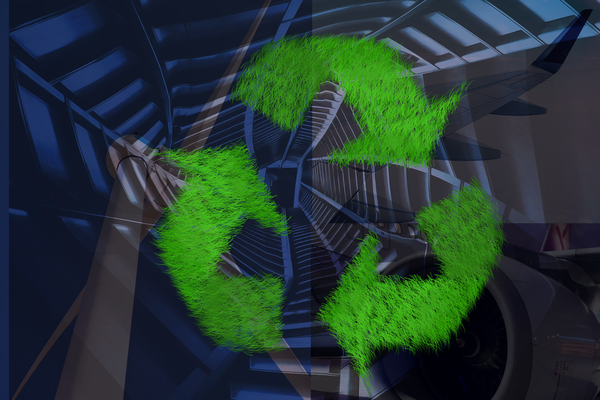In the EuReCOMP project, HTWK Leipzig is researching how composite materials can be recycled and reused.
For the energy transition, aCO2-free economy and climate neutrality to succeed, a circular economy is needed in which the use of resources, waste production, emissions and energy consumption are reduced as much as possible and material and energy cycles are closed.
However, there are currently no sustainable methods and processes for the recycling and reuse of composite materials in Europe, which are used in wind turbine components and aircraft construction, among other things. From April 2022, Robert Böhm, Professor of Lightweight Construction with Composite Materials, from the Faculty of Engineering at HTWK Leipzig will be working on this topic together with 19 other partners in the European joint project EuReCOMP.
"In the EuReCOMP project at HTWK Leipzig, our team is investigating a highly topical and, in view of current developments, also highly political issue: How can we switch high-tech industries such as aviation and key sectors such as the wind energy industry to circular concepts in Europe in the shortest possible time? The topic of recycling is just one component of a larger strategic approach that we are helping to develop at HTWK Leipzig," says Prof Böhm, explaining the project.
The R6 strategy
According to the EuReComp project scientists, the path to a circular economy, which should also include the recycling and reuse of components made from composite materials in the future, can be realised via the R6 strategy: Reuse, Repair, Refurbish, Remanufacture, Repurposeand Recycling.
Development of new recycling processes
In the EuReComp research project, Prof Böhm's team at HTWK Leipzig will pursue and research two approaches:
➤ 1st Generation Demo Case | reuse old parts/components
➤ 2nd Generation Demo Case | recycle old parts/components and process them into new parts
The 2nd Generation Demo Cases are particularly important for the automotive industry and for applications in shipbuilding. Although the recycling of components made of fibre composite materials is already possible today, the only marketable process, pyrolysis, is very harmful to the environment.
In pyrolysis, a thermochemical conversion process, organic compounds are broken down at very high temperatures and largely in the absence of oxygen. The resulting products can be reused in a variety of ways. However, every conversion process is associated with harmful emissions that need to be minimised or avoided in the future.
In the EuReComp project, Prof. Böhm will therefore be working in parallel with the Saxon partners, TU Dresden, Elbe Flugzeugwerke GmbH and the Leipzig Plastics Centre, to further develop three new environmentally friendly recycling processes, closely interlinked with the Saxon activities of the Leichtbau-Allianz-Sachsen. ( Link https://leichtbau-allianz-sachsen.de/circecon/)
Research tasks of the HTWK Leipzig
The scientists from Saxony will be researching the following topics in detail:
➤ 1) Innovative dismantling and sorting systems that enable the reuse and functional recycling of complex composite materials;
➤ 2) Novel solutions for greater reuse of entire products and components, i.e. reusability of products, upcycling, etc."
➤ 3) Pilot demonstrations of reuse and recycling concepts for composites and secondary raw materials;
➤ 4) Tools to demonstrate the circular economy and the environmental benefits of the tested solutions and
➤ 5) Design of learning resources in collaboration with local and regional educational institutions for current and future generations of workers.
"We are also addressing the question of how we can determine, calculate and evaluate the properties of components, some of which are more than 25 years old. Without knowledge of these relationships, components made from recycled materials cannot be used in practice," says Prof Böhm.
The kick-off meeting for the European joint project EuReCOMP will take place on 27 April 2022 in Athens.
ECKDATA EuReCOMP project
Project start: April 2022
Funding: The collaborative project is funded by the European Union's central funding programme for research and innovation, Horizon Europe, until spring 2026.
Project coordinator: National Technical University of Athens (Greece)
University partners: Institute of Lightweight Engineering and Polymer Technology TU Dresden, Politecnico di Torino (Italy), University of Patras (Greece)
Industrial partners: Elbe Flugzeugwerke GmbH (aviation supplier), Dallara Automobil (automotive industry, Italy), Anthony, Patrick and Murta Exportacao (wind energy sector, Portugal) and IRES (life cycle assessment, Belgium)
Research institute: Kunststoff-Zentrum in Leipzig gGmbH
